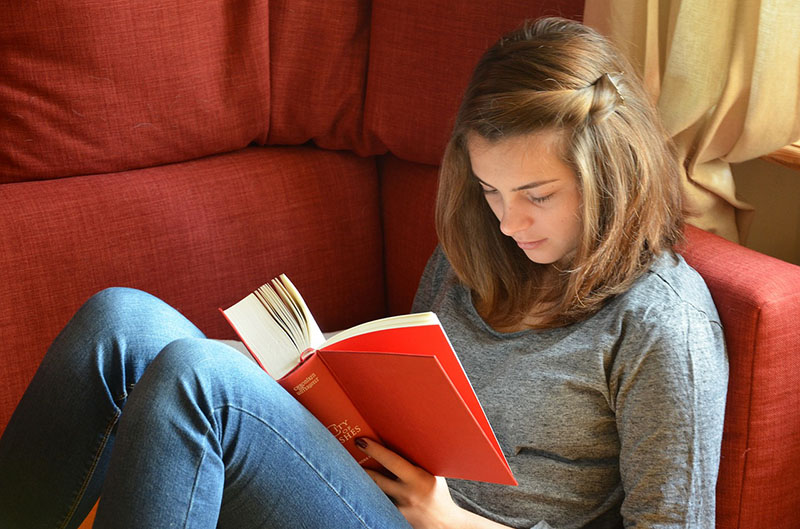
I have a confession: From pretty much the very beginning of our homeschooling adventure, I have been embarrassed by our schedule.
The four of us are all night owls by nature, and the nature of my husband’s job means that he gets home late-ish, which means that we eat dinner later than a lot of families, which means that if he wants to spend much time with the kids, they go to bed a little later.
I used to sort of fudge this a bit when talking to other homeschool families. Because I thought that responsible homeschoolers were up early (feeding their chickens), and had everyone fed and ready to start Morning Time by 8 a.m.
An even later start
Then, my son became a teen-ager. And hoo-boy, I thought we were late-starters before.
By age 14, it wasn’t uncommon at all for my son to wander out of his room dazed at 10 a.m.
It got harder to get to our homeschool group on time, and I worried because no matter what I did (no screens after dinner! lights out by 9 p.m.!), my son could not manage to fall asleep “early.”
I assumed that we had a vicious cycle going, so I started waking him early thinking then he would fall asleep earlier. This was an abysmal failure. It just meant he was exhausted and unhappy all the time.
The research begins
And so, I did some research.
I learned that teens need more than the adult average of 8 hours a night, needing up to 10 hours per night to function at their best.
Teens need more sleep than adults.
Great! So as long as I put my kid to bed at 9 p.m., he’d be up and raring to go by 8 a.m., right?
Wrong.
Biological changes
I also learned that “biological sleep patterns shift toward later times for both sleeping and waking during adolescence — meaning it is natural to not be able to fall asleep before 11:00 pm.”*
But – the public school kids, I thought!
It turns out that there is a lot of debate about this topic for public school kids as well.
Biologically, teens have different sleep patterns.
Many school districts have tried shifting to later start times, but shifting to a schedule that truly worked best for teens’ biological rhythms would mean changing a lot as a society.
If public high school started at 11 a.m., for instance, kids wouldn’t get home until 5:30 or 6 p.m.
What about after school activities and sports?
What about parents who count on their teens to watch younger siblings after school?
A new perspective
It was this podcast episode that really put things in perspective for me. (You can fast forward to the 1:04 mark to get to the part specifically about teen sleep.)
What stuck out for me as a homeschooler:
- I was reminded that we get to pick our start time. There is no one “correct” time to start your day. It might make sense to start at 8 a.m. when your kids are young and naturally wake at 6 a.m. It might make sense to start at 11 a.m. or later in the teens years.
2. From the podcast:
-
- “When sleep is abundant, minds will flourish.” – Matthew Walker, Ph.D.
- “(Teens’) biological circadian rhythm moves forward in time … it’s not their choice. They don’t get a choice in that. It’s biological; it’s hardwired.” – Matthew Walker, Ph. D.
- GPA and SAT scores “rocket-up” when you delay school start times (in high school) – Matthew Walker, Ph. D.
- “You could probably do less with more if you did it right.” – Dr. Peter Attia
‘Doing it right’
So “doing it right” might look like letting our kids get the sleep they need, starting school later, and not needing to homeschool as long because kids are more easily able to learn when we adapt to their natural rhythms.
Teens may thrive better with homeschooling in the afternoon.
That becomes a case for “afternoon school” for our teens.
Making a mindshift
Now, if I had an issue before with starting at 10 a.m., this is a huge shift for me.
It means changing a lot, and making sure my middle schooler isn’t lost in the shuffle.
I always say that the sweet spot of homeschooling is when things are working for the kids AND the homeschooling parent, so I’m going to need to think a bit to decide how best to make this work for us.
But I am taking it seriously, and I’m open to making changes to help my teen feel his best, which I believe will help him learn best.
But I’d love to hear from you – if you have a high schooler (or have graduated kids), did your schedule shift in the teen years?
*https://www.sleepfoundation.org/articles/teens-and-sleep
- Planning Christmas School - December 12, 2019
- It’s Not a Contest: When Things Feel Hard - November 7, 2019
- Getting to the root of homeschool struggles - October 4, 2019



